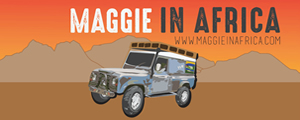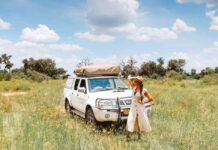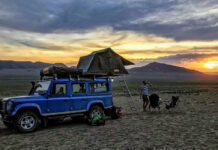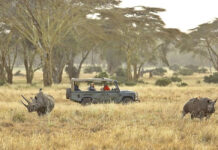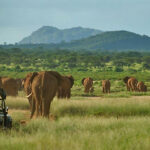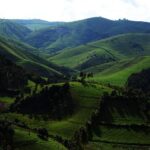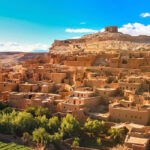Responsible tourism is essential to our travelling and overlanding philosophy.
Not only do we want to have a great time visiting some of Africa’s most beautiful places, but we also want to make sure that we’re not hurting local communities or the environment along the way.
And, wherever possible, we strive to ensure that our impact on local communities and the environment is positive!
We believe that responsible overlanding minimises negative social, economic and environmental impacts, generates economic benefits for local people, and provides opportunities to enhance the well-being of local communities.
We take both and idealist and pragmatic approach to responsible overlanding – idealist in that we strive to be as responsible as we can, but pragmatic because we recognise that it won’t always be possible to avoid negative impacts.
Recycling, for instance, is not widely practised in many African counties, and it will therefore not be practical for us to commit to recycling all of our rubbish along the way. However, we will recycle where we can and patronise establishments that are committed to environmental protection.
There is no one way to be a responsible traveller, and we understand that many issues surrounding responsible tourism are controversial. For instance, Noel and I are choosing to volunteer with and raise funds for local charities that we meet along the journey, which is important to us even though ‘voluntourism’ is becoming a controversial industry.
We recognise that ours is not necessarily the only approach, and there can me many different approaches that are all equally responsible.
With that said, these are our five rules of thumb for responsible overlanding:
1. Travel globally, spend locally
The income generated from tourism is essential to the economies of all of the countries that we intend to travel through, or have travelled through, in Africa.
However, too often money from the tourism sector never reaches local communities, and may actually end up having a negative impact on people and the environment. There are countless examples of this throughout Africa – such as the displacement of San (Bushmen) communities in Botswana to make way for tourism development in the Central Kalahari Game Reserve (CKGR), one of the country’s biggest safari parks.
It is important to us that most, if not all, of the money that we spend on our journey benefits local communities, and at the very least does not contribute to any harm. It is for this reason, for instance, that Noel and I opt not to visit the CKGR, and instead prefer to spend our time and money visiting places such as Kubu Island, which is run by a community trust, and buying souvenirs from the Kuru Art Centre, where money generated from tourism goes directly to improving the economic well-being of local communities.
2. Accessorise your vehicle to reduce fuel consumption
Let’s face it – if you want to be self-sufficient on an overland journey, you’re going to need to take a lot of equipment with you in your Land Rover, Land Cruiser, or similar gas-guzzler.
However, we have found that overlanding and self-catering camping can be an environmentally friendly was of travelling if done strategically, especially when compared to flying!
Noel learned a few hard lessons on his first trip from London to South Africa about the pitfalls of overpacking a vehicle, so as to weigh it down and cause it to consume more petrol.
For us, the trick is finding a good balance between self-sufficiency and overpacking, especially when it comes to water canisters and jerry cans, which can weigh a vehicle down a lot.
Our advice: be mindful of the weight of the kit you intend to carry, and if you don’t need it, don’t bring it!
In southern Africa, for instance, safe sources of drinking water will be available in the vast majority of camp sites and all waypoints in between. So at the most, carrying just 5 litres of water per person is more than plenty in our experience. Unless you’re planning to go into the desert for a week, don’t bring excessive amounts of water.
The same principle applies to petrol. If you have enough juice to make it to the next station, or next few stations, then stop at each station along the way to top up your main tank, rather than bothering with the reserve tanks and jerry cans. It may seem tedious to stop every few hundred kilometres, but your MPG will thank you for it in the end!
You can also choose modifications for the vehicle which are not too heavy or bulky, such as a light weight but sturdy aluminium roof rack rather than one made of heavier metals. We’ll be posting more about how we’re modifying Maggie very soon, so stay tuned!
3. Don’t pay bribes, if you can help it
Perhaps one of the biggest urban legends about travelling through Africa is that you have to pay a lot of bribes. On this point, Noel and I have vastly different opinions and experiences.
During my time living and travelling in southern Africa, I can recount perhaps only a few occasions where I think I might have been asked to pay a bribe or unwittingly did so, but I am not sure. I believe it will be possible for us to travel from South Africa to Ethiopia without paying a single bribe.
Noel, on the other hand, has had more experience being solicited for bribes, especially on his 2009 trip from London to South Africa. Noel, therefore, does not share my optimism.
Although our experiences differ, both Noel and I believe that responsible overlanding requires a no-bribery-wherever-possible attitude!
No matter how you look at it, corruption is a drain on African economies and often diverts funds that could otherwise be spent benefiting local communities, such as through tourism.
We therefore believe that it is super-duper important to avoid engaging in bribery at all costs! Here are some simple tricks for being an ANTI-BRIBERY WARRIOR:
- Never set out thinking that you are going to pay a bribe to accomplish something – this is silly and could actually get you into trouble.
- Know what fees and taxes are going to be required before you get to the border or office, so you’re not vulnerable to illegal demands for money.
- Speak to officials together, where possible. It’s easier to bribe an individual than two or more people together.
- Don’t be the easy target. Insist that you’re unwilling to pay. Be confident. Be patient. Keep insisting. Even if it takes hours. If it is a bribe, eventually the official will give up and look for an easier target.
- Demand a receipt or form explaining the payment and under which authority it is being demanded. Make sure you ask for full names and positions of the officers. Demand to speak to supervisors. Often this is enough to deter their efforts.
- If you are in a situation where you are solicited for a bribe, REPORT IT! Reporting may not result in anything, but not-reporting definitely will not and could make it harder for future travellers.
4. Take only photos, leave only footprints
Don’t litter, pollute the environment or endanger wildlife!
Ok, so, this one might go without saying… but it is definitely easier said than done on an overlanding journey, especially one that involves a lot of camping!
Dust off those scouting guide books, and remember ever thing you learned in summer camp, because it is the knowledge you will need to get you through an overlanding journey safely and responsibly.
I have an amazing memory of friend driving through the stunning Makgadikgadi Pans in Botswana, jumping out of her Land Rover every half mile to collect some bottles thrown on the side of the road. Perhaps and extreme example, but certainly admirable!
Make sure you have a rubbish system in your vehicle and in your camping routine, keeping in mind that wild animals are often attracted to trash. And if you can’t dispose of it responsibly, bring it with you until you can.
Also ensure that you know how to set up and put out campfires safely, and that you know the basics of safe bush pooping!
5. Have respect for people and the environment
This last tip is a pretty self-explanatory catch all, but perhaps the most important rule of thumb!
If you are committed to having respect for your host communities and environment, then you can definitely call yourself a responsible overlander.
The rules are simple: appreciate where you are, and the local customs and traditions of your host community. Appreciate and respect wildlife. Always remember that you are a foreigner, and are extremely privileged to be travelling through foreign countries, and you can’t go wrong.
Have any more tips for fellow responsible overlanders? Leave a comment below!
